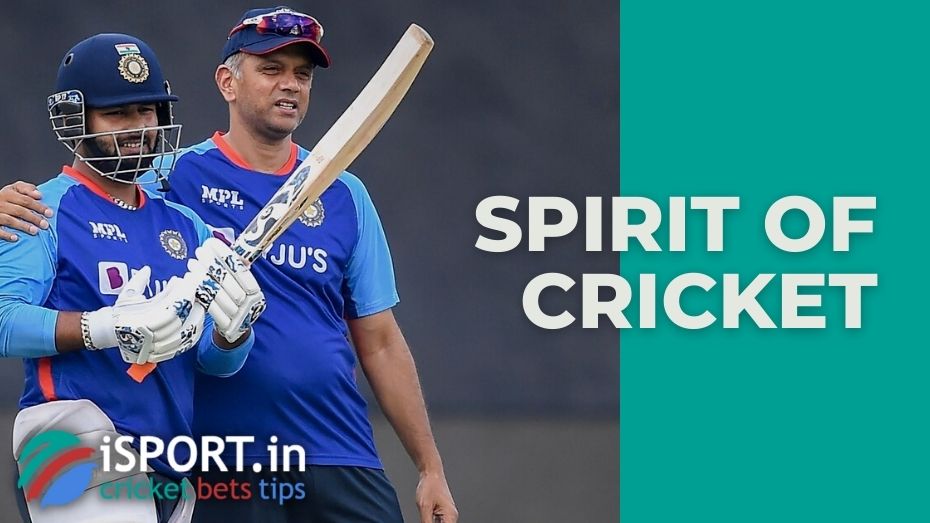Spirit of cricket (or spirit of the game)

Spirit of cricket (or spirit of the game) – the preamble to the Laws, which was presented to the public in the early noughties. Its ideological inspirers are two respected members of the Marylebone Cricket Club, former England cricket team captains Ted Dexter and Lord (Colin) Cowdrey.
Even though Spirit of cricket (or spirit of the game) was not conceived as a strictly mandatory part of the Laws, this initiative found wide support in the sports community since its main goal was to remind players that cricket is the standard of sports behavior.
In general, the tasks of Spirit of cricket (or spirit of the game) can be divided into two main groups:
- A brief introduction to the game;
- Explanation of the role of captains, players and referees on the field.
The first part of Spirit of cricket (or spirit of the game) says the following:
“Cricket is a game that owes much of its unique appeal to the fact that it should be played not only within its Laws but also within the Spirit of the Game. Any action which is seen to abuse this Spirit causes injury to the game itself. The major responsibility for ensuring the Spirit of the game lies with the captains of the opposing teams, but also extends to other players and officials, and in junior cricket – to teachers, coaches and parents.”
In cricket, it is well known that captains have a wider range of powers than, for example, in football. In addition to purely functional duties, the preamble of Laws also assigns them responsibility for observing the Spirit of cricket (or spirit of the game). In addition, the following aspects of the game are additionally regulated:
- The behavior of the players. If a player does not follow the instructions of the referee, does not respond to criticism and does not perform the prescribed actions, expressing his disagreement verbally or physically, the referee is obliged to inform the other referee, as well as the player’s direct management (that is, the captain), ordering him to take appropriate measures.
- Fair and unfair play. Only the judges have the right to evaluate the course of the game and decide on the nature of the episode. If necessary, they can interrupt the match at any time, and the captain, in turn, is obliged to take the actions provided for by the regulations.
- The referees have the right to interfere in the course of the game if there is a delay in time, damage to the court, dangerous or dishonest serve, manipulation of the ball or any other action that will be determined as dishonest.
- Spirit of cricket (or spirit of the game) obliges players to respect their opponents, their captain and team, the role of referees, as well as the game itself and its traditional values.
- The following actions are contrary to the Spirit of the game: challenging the decisions of the umpire with a word, action or gesture, using obscene language to the opponent or the umpire, as well as any deliberate rudeness (for example, filing an appeal when the batsman is not out, an aggressive reaction to the appeal, distracting the opponent by patting or noise).
- Rudeness has no place on the cricket field.
- The captains and referees provide the actual management of the game. However, it is expected that each player will be ready to make their own personal contribution.
It is also emphasized that Spirit of cricket (or spirit of the game) encourages leadership, friendship and teamwork that unites people of different nationalities, religions and cultures. Therefore, the players are obliged not only to show respect towards the managers, captains and each other, but also to show self-discipline and friendliness towards the opponent, jointly creating a positive atmosphere on the field.
Colin Cowdrey died in 2000, shortly after the publication of Spirit of cricket (or spirit of the game). Since then, the MCC annually organizes lectures in his memory, which outstanding representatives of world cricket read. So, the first of them was conducted by Richie Benaud (Australia), and the guest stars of the last five were:
- 2015-Rod Marsh;
- 2016-Brendon McCullum;
- 2017 – Brian Lara;
- 2018 – Dave Richardson;
- 2019 – Mike Brearley.
Within the framework of a special session proposed by Mark Nicholas, listeners can ask questions of interest to them.
This is interesting: the ICC annually presents the Spirit of cricket Award. Its current owners are Virat Kohli and Ellyse Perry.
You can bet on your favorite team with Riobet promo code.
